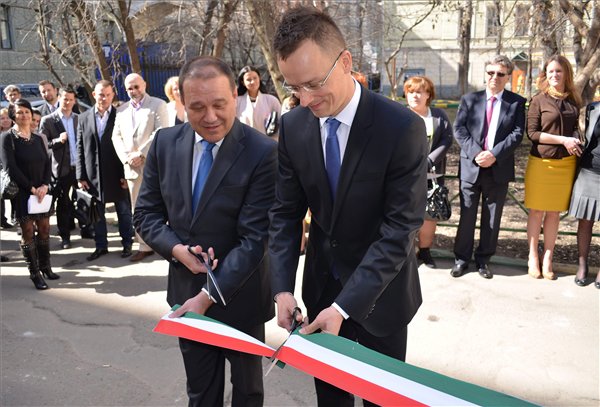Police arrest three in Quaestor case; Lázár defends Orbán

Three men were arrested late yesterday afternoon in connection with the Quaestor brokerage case, according to the National Police Headquarters’ website, and officials continued to deny insider knowledge in the case.
One of the individuals arrested is Quaestor chief and majority owner Csaba Tarsoly (pictured left, next to foreign minister Péter Szijjártó), opposition-friendly ATV television channel revealed yesterday evening. The arrest happened almost three weeks after Quaestor allegedly filed for bankruptcy, although no official filing took place until yesterday.
Earlier yesterday at a press conference held by government spokesperson András Giró-Szász and cabinet chief János Lázár, Lázár deflected blame for the entire brokerage scandal onto the brokers, whom he referred to as “thieves” and “liars”, questioning how they even obtained permits to do business in the first instance.
The press conference addressed Hungarian Prime Minister Viktor Orbánʼs admission Wednesday that he had urged government ministries to withdraw their money from Quaestor moments before the brokerage firm became insolvent. In Orbán’s defense, Lázár stressed the urgency of removing any government funds tied up in brokerages, to mitigate losses such as those experienced by the 50 local councils, which lost large sums of money in the Quaestor scandal.
Lázár explained to journalists that Orbán was only using his common sense after receiving a report he requested from the Ministry for National Economy (NGM) regarding the situation at local brokerage firms, as Buda-Cash brokerage had gone bankrupt a few days earlier. Critics charge, however, that the government acted on insider information from Quaestor, which led to the government withdrawing HUF 3.8 bln from its Quaestor account through MNKH, a state-owned company supervised by the ministry. The withdrawal was apparently made on the same day Quaestor declared insolvency.
Also yesterday, the Ministry of Foreign Affairs expressed their astonishment to origo.hu after learning that Quaestor was transferring cash rather than the securities the ministry said it had on its Quaestor account. The ministry did not respond in detail to the news portal’s query as to whether the ministry had requested a securities transfer or cash equivalent payment from the brokerage house.
The Ministry of Foreign Affairs insisted earlier this week that the withdrawal of its funds from Quaestor did not contribute to the collapse of the brokerage house. The fact that Quaestor transferred cash to the ministry on March 9, however, most likely contributed to its liquidity problems which in turn led to its insolvency on that same day.
SUPPORT THE BUDAPEST BUSINESS JOURNAL
Producing journalism that is worthy of the name is a costly business. For 27 years, the publishers, editors and reporters of the Budapest Business Journal have striven to bring you business news that works, information that you can trust, that is factual, accurate and presented without fear or favor.
Newspaper organizations across the globe have struggled to find a business model that allows them to continue to excel, without compromising their ability to perform. Most recently, some have experimented with the idea of involving their most important stakeholders, their readers.
We would like to offer that same opportunity to our readers. We would like to invite you to help us deliver the quality business journalism you require. Hit our Support the BBJ button and you can choose the how much and how often you send us your contributions.









